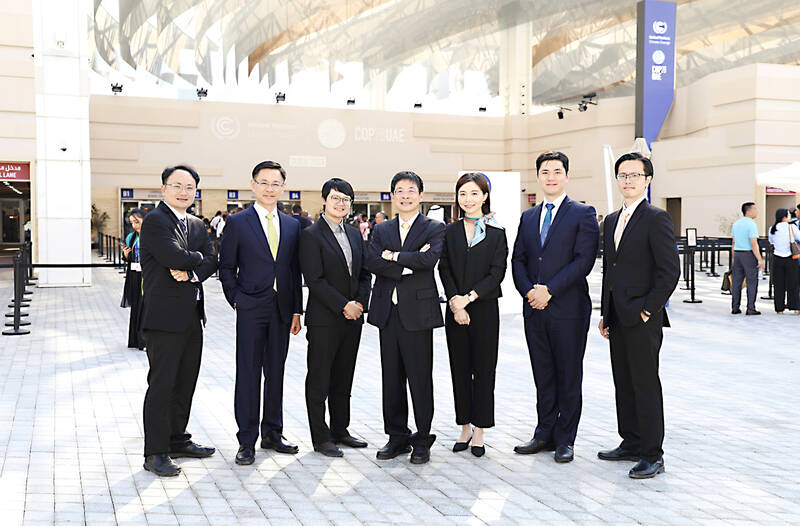The 28th United Nations Climate Change Conference of the Parties (COP28) is currently taking place in Dubai, United Arab Emirates. The conference focuses on issues such as the global stocktake (GST), mechanism for loss and damage, whether countries are proposing more ambitious Nationally Determined Contributions (NDCs) and the gradual elimination of fossil fuels.
Following COP27 in 2022, E.Sun Financial Holding chairman Joseph Huang once again leads the E.Sun Sustainability Team to COP28 to gain first-hand insights into the latest international trends and solutions for climate change and achieving net zero emissions.
In addition, political leaders, organizations and advocacy groups gathered at the World Climate Summit (WCS), the largest parallel conference to COP. Environmental ministers of many countries attended to express concerns about the negative impacts of climate change on the economy and people’s lives. Chairman Joseph Huang was once again invited to deliver a keynote speech on behalf of Taiwan’s financial industry with the topic “How Sustainability is Reshaping Taiwan’s Financial Market”. He shared how the financial industry plays a critical role in the sustainable transformation. The speech received enthusiastic responses from attendees worldwide.

Photo courtesy of E.Sun
Huang emphasized that climate change is a transnational and cross-industry issue. “If companies continue with business as usual, it will be difficult to tackle climate change. We need to do a little more, and go beyond our traditional business boundaries. Only by uniting everyone’s efforts can we have a chance of achieving the net zero target,” he said.
For example, E.Sun Bank has implemented various zero-carbon financial services, from encouraging customers to engage in green consumption and providing green building home loans to issuing carbon neutral credit cards and ATMs.
It also has plans in the works to gather carbon emission information about public transportation to encourage consumers to use public transportation. In corporate banking services, the bank has held an ESG Sustainability Initiative three years in a row, conducted one-on-one sustainability consultations with over 150 companies and established a “Sustainable Transformation Platform” in collaboration with 11 cross-industry consultants to provide practical solutions for corporate net-zero transformation.
Moreover, E.Sun serves as the rotating chair of the “Coalition of First-movers for Sustainable Finance” in 2024, promoting collaboration rather than competition and driving the overall net zero transformation progress of Taiwan’s financial industry and cooperating with the Financial Supervisory Commission and the net zero working group.
“The more we do, the more we can do!” When we do more, we are capable of doing even more. E.Sun believes that through international, governmental, industrial, and market collective efforts, everyone can contribute climate-friendly actions in their respective fields, which can be merged into a positive force that changes the environment and accelerates the net-zero transition, assisting Taiwan and the world in moving towards the beautiful vision of net zero by 2050.

The US dollar was trading at NT$29.7 at 10am today on the Taipei Foreign Exchange, as the New Taiwan dollar gained NT$1.364 from the previous close last week. The NT dollar continued to rise today, after surging 3.07 percent on Friday. After opening at NT$30.91, the NT dollar gained more than NT$1 in just 15 minutes, briefly passing the NT$30 mark. Before the US Department of the Treasury's semi-annual currency report came out, expectations that the NT dollar would keep rising were already building. The NT dollar on Friday closed at NT$31.064, up by NT$0.953 — a 3.07 percent single-day gain. Today,

‘SHORT TERM’: The local currency would likely remain strong in the near term, driven by anticipated US trade pressure, capital inflows and expectations of a US Fed rate cut The US dollar is expected to fall below NT$30 in the near term, as traders anticipate increased pressure from Washington for Taiwan to allow the New Taiwan dollar to appreciate, Cathay United Bank (國泰世華銀行) chief economist Lin Chi-chao (林啟超) said. Following a sharp drop in the greenback against the NT dollar on Friday, Lin told the Central News Agency that the local currency is likely to remain strong in the short term, driven in part by market psychology surrounding anticipated US policy pressure. On Friday, the US dollar fell NT$0.953, or 3.07 percent, closing at NT$31.064 — its lowest level since Jan.

Hong Kong authorities ramped up sales of the local dollar as the greenback’s slide threatened the foreign-exchange peg. The Hong Kong Monetary Authority (HKMA) sold a record HK$60.5 billion (US$7.8 billion) of the city’s currency, according to an alert sent on its Bloomberg page yesterday in Asia, after it tested the upper end of its trading band. That added to the HK$56.1 billion of sales versus the greenback since Friday. The rapid intervention signals efforts from the city’s authorities to limit the local currency’s moves within its HK$7.75 to HK$7.85 per US dollar trading band. Heavy sales of the local dollar by

The Financial Supervisory Commission (FSC) yesterday met with some of the nation’s largest insurance companies as a skyrocketing New Taiwan dollar piles pressure on their hundreds of billions of dollars in US bond investments. The commission has asked some life insurance firms, among the biggest Asian holders of US debt, to discuss how the rapidly strengthening NT dollar has impacted their operations, people familiar with the matter said. The meeting took place as the NT dollar jumped as much as 5 percent yesterday, its biggest intraday gain in more than three decades. The local currency surged as exporters rushed to